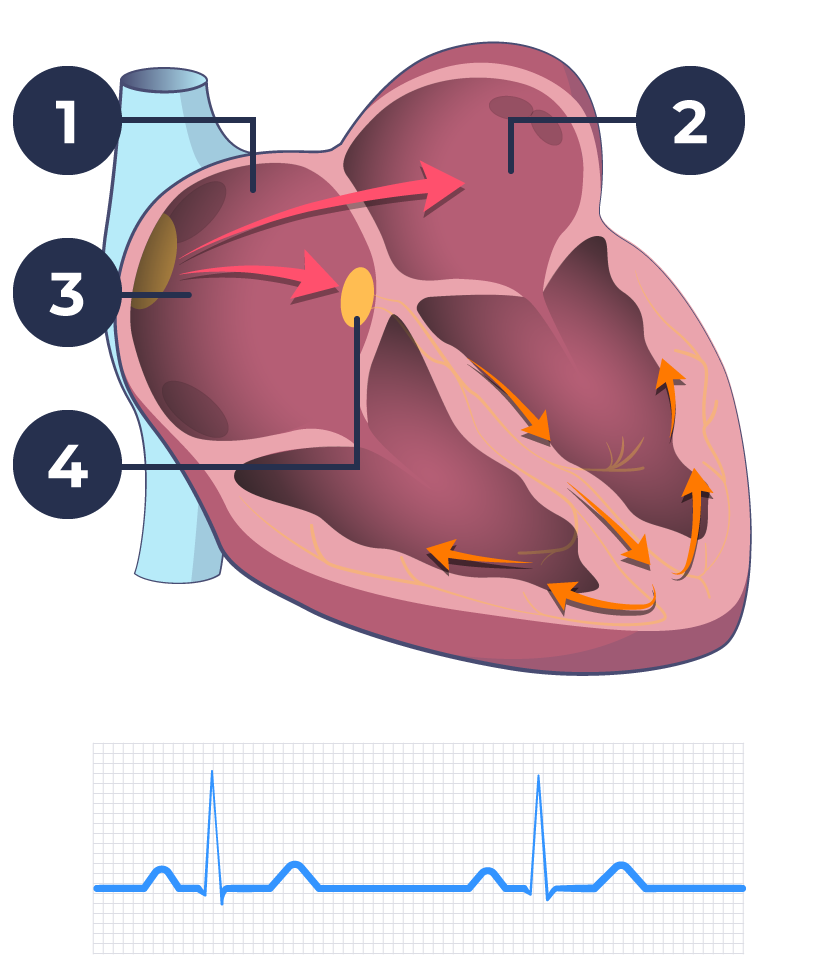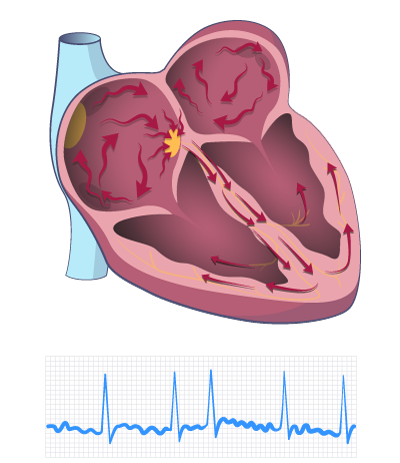AFib, atrial Fibrillation
by Rhythm Doctor

Atrial fibrillation is clearly the most widespread heart rhythm disorder we know of. Approximately 150,000 Danes have atrial fibrillation. Some have it all the time. This is called persistent atrial fibrillation in “medical parlance”. Many have it only for periods. This is called, among other things, periodic atrial fibrillation.
The older we get, the greater the risk that we get atrial fibrillation. The number of citizens with atrial fibrillation is increasing as we get older and older. Each year there are approx. 20,000 new cases of atrial fibrillation in Denmark. This is expected to increase in the future with increasing life expectancy. Between one in three and one in four of us will – at some point in our lives – get atrial fibrillation.
If you have atrial fibrillation, you have an increased risk of developing blood clots. Unfortunately, some of these blood clots often lodge in the brain. Around 4,000 Danes get a blood clot in the brain every year due to atrial fibrillation. You can die from, or be severely disabled by, a blood clot in the brain. However, blood thinners can prevent blood clots. It is therefore important, if you have atrial fibrillation and have been prescribed blood-thinning medication, that you remember to take it and – just as importantly – keep taking it.
Atrial fibrillation can weaken the heart’s pumping power, so that you develop “heart failure”. This applies especially if the heart rate has been very high for a long time. The heart muscle cells can become “flabby” and thus cannot contract with their normal force. Fortunately, the heart often recovers if the heart rate drops again. The lower heart rate can come as a result of medical treatment or because you via an operation such as ablation, once again gets a stable and normal heart rhythm.
WHAT ARE THE CHARACTERISTICS OF ATRIAL FIBRILLATION?
If you have periodic AFib / atrial fibrillation, you will often find that you cannot do what you are used to and are easily short of breath. You may get tired more easily when you have to work in the garden, go for a walk in the forest or play sports. If you occasionally find that you cannot do what you normally do without being short of breath and tired, you should talk to your doctor. It could be that you have had problems with atrial fibrillation.
If you have had atrial fibrillation and it is constantly present – i.e. around the clock and throughout the week – you will typically be able to feel the physical limitations all the time. You thus easily get tired and out of breath during your normal activities. Not everyone notices the limitations the disease has brought. Especially not if it is constantly present. Maybe you think it’s because you’ve gotten older, that you’ve gotten in a bit of a bad shape, or you find another possible explanation that you can be satisfied with. BUT it can be dangerous to go undetected with atrial fibrillation. You can risk getting a blood clot in the brain because you don’t get blood-thinning medicine. Or that you may risk heart failure if the pulse has been too fast over a long period of time. So you must see your doctor if you suspect that you may have atrial fibrillation. Anything else will be stupid, to put it bluntly.
QUALITY OF LIFE AND Atrial fibrillation
Atrial fibrillation can be associated with a reduced quality of life and anxiety, for example, because of a blood clot due to the disease. You may lose the desire to meet socially, play sports, travel abroad, etc. Perhaps fear will control your life too much. Recent research has shown that you have a greater risk of losing your attachment to the labor market if you get atrial fibrillation. Fortunately, knowledge about atrial fibrillation, the consequences of the disease, and correct treatment can mean that you can have a really good life – even if you have this serious disease.
Sinus rhythm

1. Right atrium, 2. Left atrium,
3. Sinus node, 4. AV node
AFib

While there is atrial fibrillation, the heart’s pumping function will function ineffectively. This means that less energy comes out to the body than usual. You will typically feel this as an increased tendency to be short of breath. And that you get tired faster. Some also feel the restless heartbeat. It is not uncommon to often have to get rid of the water while atrial fibrillation is on.
Level of treatment and method of treatment
There are, in the main, three factors that must be taken into account when deciding on the level of treatment and method of treatment:
- Atrial fibrillation can lead to an increased risk of precursors to blood clots forming in the left atrium. These blood clots have a dull tendency to be carried with the blood flow to the brain and settle as blood clots here. To avoid this, one must decide whether to start treatment with so-called blood-thinning medication.
- Is the heart rate on average within the acceptable range, or is the heart rate on average too fast? A pulse that is too fast can – in the long term – lead to reduced pumping function of the heart
- How much are you bothered by your atrial fibrillation? Your symptoms will largely help to determine how much to invest in treatment.
Treatment for atrial fibrillation aims to reduce the risk of blood clots and to give you the best possible quality of life. In the treatment of atrial fibrillation, you can basically choose two strategies:
- To accept the presence of atrial fibrillation, but make sure that the conduction of impulses from the atria to the ventricles does not become too rapid.
- Try to eliminate the tendency to atrial fibrillation, either with medication or with a so-called ablation.

Become the captain of your life with Afib
Knowledge about atrial fibrillation, including understanding what the rhythm disorder does to you – and what treatment options are available – is important to being able to live a good life despite the fact that the heart rhythm is periodically or constantly out of rhythm. You will once again be the “captain of your own life” – even if you have had the misfortune of having problems with recurring or constant atrial fibrillation.
My own experience is, through more than 25 years of work with atrial fibrillation, that the necessary knowledge for people with this problem can be difficult to find and understand. And that we, as doctors and other health professionals, are not always aware of the importance of this. This is the background to why I have developed the blog “Rytmedoktor”.
